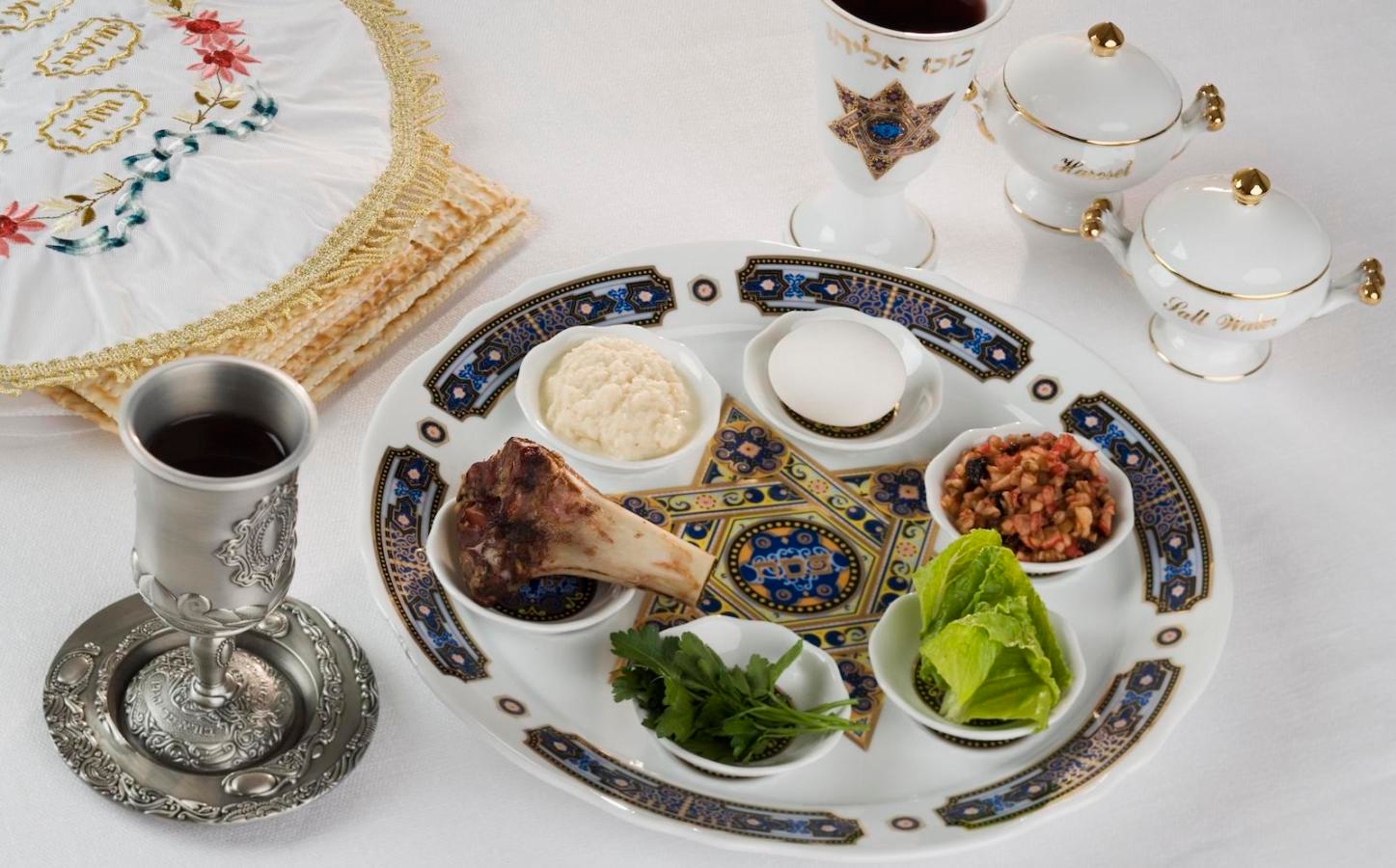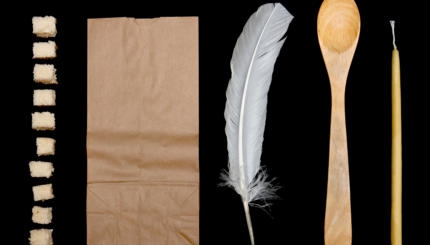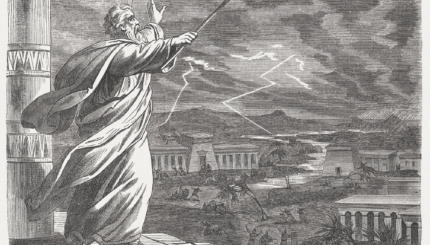Of all the Jewish holidays, Passover is the one most likely to be observed—by the faithful and the
questioning, the pious and the irreverent, the traditional and the radical. But what is the meaning of this
holiday, which has such a grip on the collective Jewish imagination?
A talmudic dispute offers two different visions of the essence of the holiday, both derived from a strangely phrased verse in Exodus 12:42 describing the Exodus from Egypt:
לֵ֣יל שִׁמֻּרִ֥ים הוּא֙ לַֽיהוָ֔ה לְהוֹצִיאָ֖ם מֵאֶ֣רֶץ מִצְרָ֑יִם הֽוּא־הַלַּ֤יְלָה הַזֶּה֙ לַֽיהוָ֔ה שִׁמֻּרִ֛ים לְכָל־בְּנֵ֥י יִשְׂרָאֵ֖ל לְדֹרֹתָֽם
That was for the LORD a night of vigil to bring them out of the land of Egypt; that same night is the
LORD’s, one of vigil for all the children of Israel throughout the ages.
What does it mean to call Passover eve a night of vigil?
Rabbi Yehoshua argues Rosh Hashanah 11b that Passover is a night of vigil because that night has been guarded and protected throughout history for redemption. On that night, miracles are possible, both for the ancient Israelites, and for us today.

Help us keep Jewish knowledge accessible to millions of people around the world.
Your donation to My Jewish Learning fuels endless journeys of Jewish discovery. With your help, My Jewish Learning can continue to provide nonstop opportunities for learning, connection and growth.
Rabbi Eliezer, on the other hand, argues that the eve of Passover is a night of vigil because on that night, we are guarded by God and protected from all evil.
At the heart of their dispute is the question: Is Passover fundamentally about reigniting the eternal dream of redemption—for our people and for all people—or is it about liberating us, for one night, from paralyzing fear?
At the heart of my faith is the redemptive narrative. The story of our ancestors leaving Egypt is told and retold not because it was a one-time event, but instead because it birthed a new, redemptive paradigm. This story becomes an eternal reminder that our ancestors journeyed from slavery to freedom, from sorrow to joy, from mourning to celebration, from darkness to a great light, and from enslavement to redemption Mishnah Pesahim 10:5, and so will we.
When we sit down to seder, on the eve of Passover, we remember that we’ve seen terrible darkness before. We have been imprisoned, enslaved, deported, and dehumanized. Our holy sites have been desecrated. We have been surrounded by devastation and destruction.
But our story doesn’t end in darkness. Ours is a journey m’afeilah l’orah — from darkness to light.
We learned this when we left Egypt and began that long walk toward freedom in the Promised Land. We held this truth when we were murdered and exiled and enslaved in 70 CE. We fought to remember this through hundreds of years of pogroms and expulsions. We whispered this truth to one another in the barracks of the slave labor camps. Facing liquidation in the Warsaw Ghetto, Jews prepared seder.
And of course it’s not only Jews who have found spiritual fuel in this story. Michael Walzer writes that the story of the Exodus is almost ubiquitous: “Wherever people know the Bible and experience oppression the Exodus has sustained their spirits and inspired their resistance.”
The reminder of this journey, called yetziat mitzrayim—leaving the narrow place—has held us and strengthened us and breathed life back into us.
It’s especially important in days like these that we remember that long, promising, ascent from Egypt to the Promised Land. Our story doesn’t promise instant gratification or magical redemption. But it does reinforce over generations the trajectory from narrowness to expansiveness, from death to life.
Every time we tell this story, we rediscover hope, hidden in the recesses of our hearts and essential to our spiritual survival. In fact, this story is the closest thing we come to the genetic transmission of hope—the rarest and most precious commodity in times of darkness.
We desperately need a redemption narrative today. So this year, we will sit down to seder and say: Maybe THIS night will be the beginning of a new chapter, the turning of the tide toward redemption. That’s the message of Passover, according to Rabbi Yehoshua.
But this year, I cannot ignore the voice of Rabbi Eliezer. What if Passover, at its core, is not about redemption, but about protection? What if the meaning of this holiday is that there is one night a year in which we hold full awareness of the danger all around us (and there’s always danger around us), but choose not to be afraid?
Passover, then, becomes a defiant cry in the darkness: Tonight, we will not be defined by fear!
I am afraid. I’ve been afraid since the moment this virus began its deadly spread.
I’m afraid to buy groceries, and I’m afraid to ask someone else to get them for me. I’m afraid that I’ll hurt someone by not showing up by their side in a time of need, even though I know we’re not supposed to go out. I’m afraid that my parents will get sick and I wouldn’t be able to care for them. I’m afraid that when the grip of this virus loosens, I’ll make the wrong call for our community, and our gatherings will lead to people getting sick. I’m afraid that this crisis is stripping our community and city and the world bare, and in desperation, people will soon turn on one another. I’m afraid that my kids are losing their childhood innocence to a crisis that could bring out the worst in all of us.
But according to Rabbi Eliezer, seder night is one night not to be dominated by those fears. Amid the haze of grief and loss—lost loved ones, lost love, lost opportunities, wages, job security, lost savings and lost donations, lost dreams, lost college graduations, proms and b’nai mitzvah—we affirm that even with all our loss, we are not completely lost.
Only once the fear is lifted, can we recognize that the blessing of freedom is the ability to reclaim our agency, even when so much has been taken from us.
In a pandemic, we can’t choose whose seder table we’ll sit at. But we are still free to choose how we’ll hold all that we’ve already learned this past month. Like how much community matters, and what a blessing real friends are. Like the fact that health crises disproportionately endanger the poor and the elderly, and that the judge of society is not how we treat the most powerful, but how we care for most vulnerable. And the undeniable truth that when profit and political expedience supersede moral responsibility, we all pay the price.
Without fear dominating our hearts and minds, on seder night we can hold the precious awareness that we are all connected by an invisible web of humanity that crosses land and sea. That teachers deserve to be paid a lot more. That medical professionals are superheroes disguised as regular people. That FaceTime Scrabble with grandparents is a superb way to spend the evening. That we are all responsible for one another.
We can choose to lift up the now-shared knowledge that norms can shift quickly—for the worse and also for the better. That we all need to work on building our resiliency tools. That we can live with a lot less than we might have thought, and that we all need to slow the hell down. That the world is really, really small. That our bodies are precious and that touch is sacred and ought never to be taken for granted. That breath is a gift, and so is prayer. That there is still beauty, everywhere.
What we do with all our newfound awareness is an expression of agency—the ultimate expression of freedom. And you can’t have agency if you’re frozen in fear.
This year, I will hold Passover as both a night of redemption and a night free from fear. Because this year, we need both.
Our routines have been upended and our lives put on hold. We and our loved ones are profoundly vulnerable. And yet we’re still here.
Passover in a time of pandemic calls us to transform this hour of collective terror into a time of collective awakening. To let our vulnerability and awareness become an anchor in the storm, a reminder of the power of faith, which we’ll need when all this is over, as we lift one another off the floor and work together to build a society of radical accountability, rooted in equity and equality, justice and dignity, and most of all, of love.
So this year, amid the devastation and destruction, I pray that we’re able to temporarily set aside our fear, precisely so that we can reclaim the dream of redemption that has stood at the heart of our shared story for thousands of years. May it be a Passover of comfort, hope, and strength for all of us.



